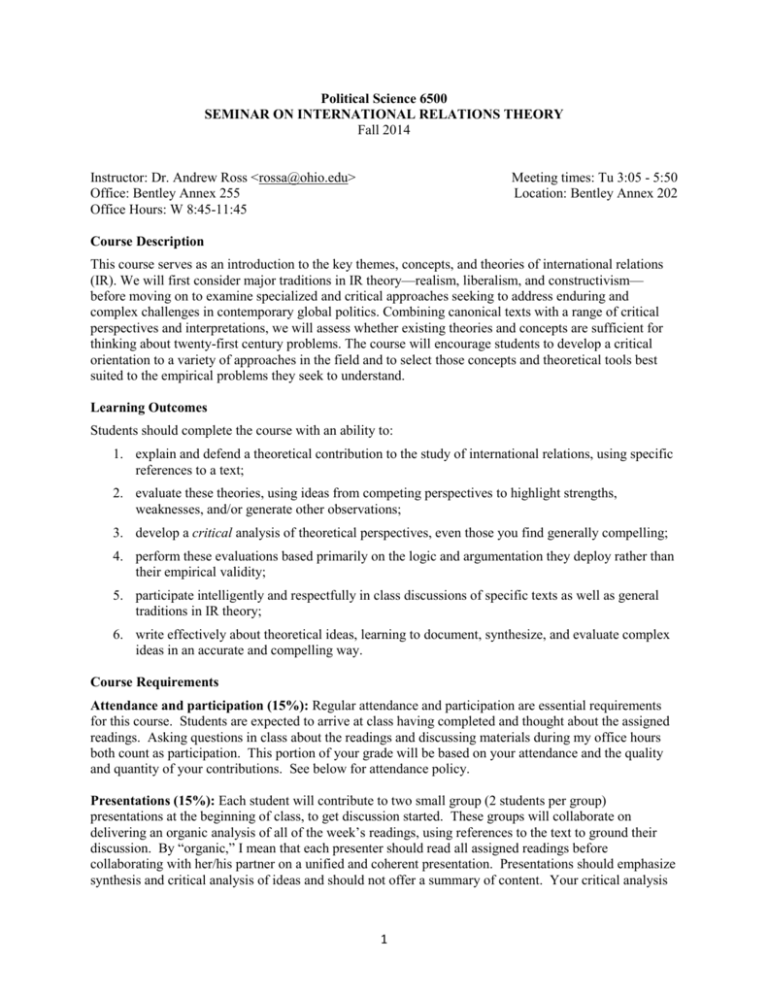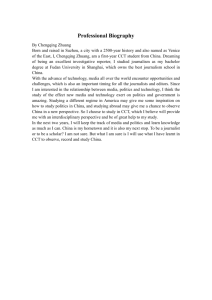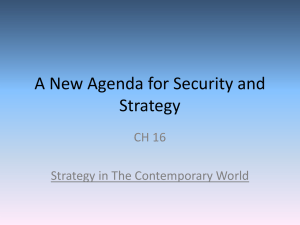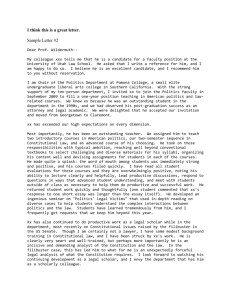Seminar in International Relations Theory
advertisement

Political Science 6500 SEMINAR ON INTERNATIONAL RELATIONS THEORY Fall 2014 Instructor: Dr. Andrew Ross <rossa@ohio.edu> Office: Bentley Annex 255 Office Hours: W 8:45-11:45 Meeting times: Tu 3:05 - 5:50 Location: Bentley Annex 202 Course Description This course serves as an introduction to the key themes, concepts, and theories of international relations (IR). We will first consider major traditions in IR theory—realism, liberalism, and constructivism— before moving on to examine specialized and critical approaches seeking to address enduring and complex challenges in contemporary global politics. Combining canonical texts with a range of critical perspectives and interpretations, we will assess whether existing theories and concepts are sufficient for thinking about twenty-first century problems. The course will encourage students to develop a critical orientation to a variety of approaches in the field and to select those concepts and theoretical tools best suited to the empirical problems they seek to understand. Learning Outcomes Students should complete the course with an ability to: 1. explain and defend a theoretical contribution to the study of international relations, using specific references to a text; 2. evaluate these theories, using ideas from competing perspectives to highlight strengths, weaknesses, and/or generate other observations; 3. develop a critical analysis of theoretical perspectives, even those you find generally compelling; 4. perform these evaluations based primarily on the logic and argumentation they deploy rather than their empirical validity; 5. participate intelligently and respectfully in class discussions of specific texts as well as general traditions in IR theory; 6. write effectively about theoretical ideas, learning to document, synthesize, and evaluate complex ideas in an accurate and compelling way. Course Requirements Attendance and participation (15%): Regular attendance and participation are essential requirements for this course. Students are expected to arrive at class having completed and thought about the assigned readings. Asking questions in class about the readings and discussing materials during my office hours both count as participation. This portion of your grade will be based on your attendance and the quality and quantity of your contributions. See below for attendance policy. Presentations (15%): Each student will contribute to two small group (2 students per group) presentations at the beginning of class, to get discussion started. These groups will collaborate on delivering an organic analysis of all of the week’s readings, using references to the text to ground their discussion. By “organic,” I mean that each presenter should read all assigned readings before collaborating with her/his partner on a unified and coherent presentation. Presentations should emphasize synthesis and critical analysis of ideas and should not offer a summary of content. Your critical analysis 1 should leave the class with at least two puzzles or critical observations for discussion. Depending on the material covered, I may elect to build up further groundwork before proceeding to class discussion of the problems presented by your group. Each student will contribute to two of these presentations during the semester, according to a schedule determined by me and based as much as possible on students’ preferences. Short paper (15%): You will write a 5-page paper in which you critically analyze this contention: “Because international politics is anarchic, states always prioritize self-preservation above considerations of morality or justice.” You should use as many of the assigned readings from September 2 as possible, and then discuss readings from September 9 where relevant. Include brief and accurate citations from the texts to support your argument. You may use examples from cases you are familiar with, but you should not need to do additional research for this assignment. The paper is due via Blackboard (under “Submissions”) by Monday, September 22 at noon. Research paper (45%): You will write a 15–20-page research paper that builds on one of the perspectives we have considered during the semester. You should discuss your topic with me by Friday, October 17. Then, you will submit an abstract and annotated bibliography via Blackboard (also under “Submissions”) by Friday, November 8 at noon. You’ll submit one document consisting of (a) a twopage (double-spaced) abstract of the paper and (b) a bibliography with annotated entries for five key secondary sources (max. one from the syllabus at this stage). Details will be provided on a handout, available on Blackboard (under “Assignments”). The abstract and annotated bibliography are worth 10% of your final grade. The paper itself is worth 35% and is due via Blackboard (under “Submissions”) by Friday, December 12 at noon. Paper workshop (10%): All students will participate in a paper workshop during our last class (December 2). Workshop format will be determined by the number of students enrolled, but at a minimum each student will present her or his paper and be expected to read and offer feedback on one other paper. Each presenter must circulate by end-of-day November 30 a reasonable first draft of the paper. Portions of the paper may be missing, but you should have at least ten pages, including introduction and a section where you advance your main arguments. Your grade for the workshop will be based on the quality of both your ten pages and the peer feedback you offer in class. Grades and Late Papers I use a standard grading scale for determining letter grades: A = 93-100; A- = 90-92; B+ = 87-89; B = 8386; B- = 80-82; C+ = 77-79; C = 73-76; C- = 70-72; D+ = 67-69; D = 63-66; D- = 60-62; F = <60. There will be no make-up assignments, extra credit assignments, or opportunities to revise and resubmit assignments for a higher grade. If you have concerns about your grade or my expectations for writing assignments, please schedule a meeting with me as early as possible. Late papers will be penalized 6 points per day (e.g. a paper awarded an 88/B+ submitted one day late will receive an 82/B-), including weekend days, to a maximum of three days (after which the assignment will not be graded). No exceptions in cases of computer malfunction or loss of data. Cases of serious illness should be brought to my attention, with official documentation, prior to or immediately following the missed assignment. Attendance I strongly encourage students to attend every class. To accommodate minor illness or other occasional events, I allow all students to miss up to two classes (except for paper workshop) without documentation or explanation. I recommend reserving one or both of these allowed absences in case you get sick later in the semester. If you miss class due to minor illness, traffic delays, student conferences, athletics events, 2 family obligations, or the like, that missed class will count toward these two allowed absences. This policy means that your participation grade will be reduced starting with the third missed class. The penalty will increase for each class missed, up to five absences. If you miss six or more classes, you will get an “F” for your participation grade. Do not expect full attendance credit if you arrive late or leave early; arriving late on a regular basis may count as part of the allowed absences. Students are responsible for all course materials covered and announcements made during missed classes. If you are missing class due to on-going health problems (physical or mental), please discuss the situation with me as early as possible. Technology Please turn off your cell phone ringer and put the device away during class time (we will have a break half-way through class during which you can text much as you like). You may use a laptop or tablet in class for taking notes and accessing electronic readings; however, I will reserve the right to ban these devices if I or another student judge(s) them to be disruptive. All students will be expected to use the Blackboard system to access readings, announcements, and handouts, and to submit assignments. If you encounter a broken link, a missing content item, or something else I need to fix, please let me know via email as soon as possible. If you are having general problems with Blackboard, contact the Help Desk immediately; I am happy to help where possible, but I cannot be responsible for general problems an individual student is experiencing with a her or his computer, a university computer, or a university website. Students are expected to check their OU email regularly for announcements or other communications. Assignments submitted by email without special permission beforehand may not be accepted. Students are responsible for ensuring that all electronically submitted documents are open-able and contain the correct data (i.e. “I sent the wrong document by mistake” will not work ). Academic Misconduct Students in this course are expected to follow the University’s standards of academic integrity and honesty and are responsible for understanding what constitutes plagiarism. One useful reference is here: http://www.ohio.edu/communitystandards/academic/students.cfm. If you are caught cheating or plagiarizing, you may receive a grade deduction on the assignment, a failing grade for the assignment, or a failing grade for the class. You may also be reported to the Office of Community Standards and Student Responsibility for additional sanctions. Students may appeal academic sanctions through the grade appeal process. Disability Accommodations Information regarding accommodations in course work and assessment for students with a disability, and available resources offered by the Office of Student Accessibility Services. Any student who suspects s/he may need an accommodation based on the impact of a disability should contact me privately to discuss your specific needs and provide written documentation from the Office of Student Accessibility Services. If you are not yet registered as a student with a disability, you should contact the Office of Student Accessibility Services. Changes to Syllabus I may need to make minor changes to this syllabus during the semester. If I do so, I may distribute an updated version via email, via Blackboard, and/or in-class. Required Texts All required readings are available as PDF files on Blackboard, under “Readings.” Recommended readings are available through the regular channels at the library. 3 Additional Resources For general introductions to international relations theory, you can order these books through OhioLink: Burchill, Scott et al., eds. Theories of International Relations, fifth edition. New York: Palgrave, 2013. Dunne, Tim, Milja Kurki and Steve Smith, eds. International Relations Theories: Discipline and Diversity, second edition. New York: Oxford: Oxford University Press, 2010. COURSE TOPICS AND READINGS I. INTRODUCTION AND CLASSICAL DEBATES August 26: Introduction Read over this syllabus carefully September 2: Morality and Power Politics Carr, E.H. Chapter 1 in The Twenty Years' Crisis, 1919-1939, reissued edition (New York: Palgrave, 2001). 3-11. Morgenthau, Hans. Chapter 7 in Scientific Man vs. Power Politics. Chicago: University of Chicago Press, 1946. 168-203. Morgenthau, Hans J. Chapters 1 and 16. Politics among Nations: The Struggle for Power and Peace. Edited by Kenneth Thompson. 4th ed. New York: Knopf, 1967. 3-14, 224-49. Williams, Michael C. “Why Ideas Matter in International Relations: Hans Morgenthau, Classical Realism, and the Moral Construction of Power Politics.” International Organization 58, no. 4 (2004): 63365. Scheuerman, William E. Chapter 2 in Hans Morgenthau: Realism and Beyond. Malden, MA: Polity Press, 2009. 40-69. Recommended: Levine, Daniel J. "Why Hans Morgenthau Was Not a Critical Theorist (and Why Contemporary Realists Should Care)." International Relations 27, no. 1 (2013): 95-118. Spegele, Roger D. Political Realism in International Theory. New York: Cambridge University Press, 1996. Steele, Brent J. “'Eavesdropping on Honored Ghosts': From Classical to Reflexive Realism.” Journal of International Relations and Development 10, no. 3 (2007): 272-300. Walker, R.B.J. “Realism, Change, and International Political Theory.” International Studies Quarterly 31, (1987): 65-86. Williams, Michael C. The Realist Tradition and the Limits of International Relations. New York: Cambridge University Press, 2005. II. TRADITIONAL THEORIES September 9: Neorealism Waltz, Kenneth N. Chapter 5 and 6 in Theory of International Relations. Reading, MA: Addison-Wesley, 1979. Reproduced as chapters 4 and 5 in Robert O. Keohane, ed. Neorealism and its Critics, 70130. New York: Columbia University Press, 1986. 4 Mearsheimer, John J. Chapter 2 in The Tragedy of Great Power Politics. New York: W.W. Norton & Co., 2001. 29-53. Schweller, Randall L. “Bandwagoning for Profit: Bringing the Revisionist State Back In.” International Security 19, no. 1 (1994): 72-107. Lake, David A. “Escape from The State of Nature: Authority and Hierarchy in World Politics.” International Security 32, no. 1 (2007): 47-79. Recommended: Ashley, Richard K. "The Poverty of Neorealism." In Neoreallism and Its Critics, edited by Robert O. Keohane, 255-300. New York: Columbia University Press, 1986. Buzan, Barry, Charles A. Jones, and Richard Little. The Logic of Anarchy: Neorealism to Structural Realism, New Directions in World Politics. New York: Columbia University Press, 1993. Deudney, Daniel H. Bounding Power: Republican Security Theory from the Polis to the Global Village. Princeton: Princeton University Press, 2008. Donnelly, Jack. Realism and International Relations. New York: Cambridge University Press, 2000. Gilpin, Robert. War and Change in World Politics. New York: Cambridge University Press, 1981. Snyder, Glenn H. “Mearsheimer's World: Offensive Realism and the Struggle for Security.” International Security 27, no. 1 (2002): 149-173. Waltz, Kenneth N. Man, the State, and War: A Theoretical Analysis. New York: Columbia University Press, 1959. (especially chapter VI). September 16: Neoliberalism Axelrod, Robert and Robert O. Keohane, “Achieving Cooperation under Anarchy: Strategies and Institutions.” World Politics 38, no. 1 (1985): 226-54. Keohane, Robert. Chapters 1 and 11. After Hegemony: Cooperation and Discord in the World Political Economy. Princeton: Princeton University Press, 1984. 5-17; 49-84. Mearsheimer, John. “The False Promise of International Institutions.” International Security 19, no. 3 (1994-5): 5-49. Richardson, James. “The Ethics of Neoliberal Institutionalism.” In Christian Reus-Smit and Duncan Snidal, eds. The Oxford Handbook of International Relations, 234-55. New York: Oxford University Press, 2008. Recommended: Axelrod, Robert. The Evolution of Cooperation. New York: Basic Books, 1984. Baldwin, David A., ed. Neorealism and Neoliberalism. New York: Columbia University Press, 1993. Keohane, Robert O. and Joseph S. Nye. Power and Interdependence, 2nd ed. New York: HarperCollins, 1989. Krasner, Stephen D. Sovereignty: Organized Hypocrisy. Princeton: Princeton University Press, 1999. Oye, Kenneth, ed. Cooperation Under Anarchy. Princeton: Princeton University Press, 1986. Sterling-Folker, Jennifer. "Competing Paradigms or Birds of a Feather? Constructivism and Neoliberal Institutionalism Compared." International Studies Quarterly 44, no. 1 (2000): 97-119. September 23: Democratic Peace Theory Doyle, Michael C. “Liberalism and World Politics.” American Political Science Review 80, no. 4 (1986): 1151-69. Muppidi, Himadeep. “State Identity and Interstate Practices: The Limits to Democratic Peace in South Asia.” Democracy, Liberalism, and War: Rethinking the Democratic Peace Debate. Ed. Tarak Barkawi and Mark Laffey. Boulder, CO: Lynne Rienner, 2001. 45-66. 5 Smith, Tony. “Democratic Peace Theory: From Promising Theory to Dangerous Practice.” International Relations 25, no. 2 (2011): 151-57. Geis, Anna. “Of Bright Sides and Dark Sides: Democratic Peace Beyond Triumphalism.” International Relations 25, no. 2 (2011): 164-70. Recommended: Brown, Michael E., Sean Lynn-Jones, Stephen Miller, eds. Debating the Democratic Peace. Cambridge: MIT Press, 1996. Hobson, Christopher, Tony Smith, John M. Owen, Anna Geis, and Piki Ish-Shalom. "Between the Theory and Practice of Democratic Peace." International Relations 25, no. 2 (2011): 147-84. Jahn, Beate. “Kant, Mill and Illiberal Legacies in International Affairs.” International Organization 59, no. 1 (2005): 177-207. Mansfield, Edward and Jack Snyder. “Democratization and the Danger of War.” International Security 20.1 (1995) 5-38. Owen, John M. Liberal Peace, Liberal War: American Politics and International Security. Ithaca: Cornell University Press, 1997. Russett, Bruce. Grasping the Democratic Peace: Principles for a Post-Cold War World. Princeton: Princeton University Press, 1993. III. CONSTRUCTIVIST THEORIES September 30: Socialization, Identity, and Norms Wendt, Alexander. “Anarchy is What States Make of It: The Social Construction of Power Politics.” International Organization 46, no. 2 (1992): 391-425. Wendt, Alexander. Chapter 6 in Social Theory of International Politics. New York: Cambridge University Press, 1999. 246-312. Hurd, Ian. “Breaking and Making Norms: American Revisionism and Crises of Legitimacy.” International Politics 44, (2007): 194-213. October 7: Legitimacy and Power Hurd, Ian. “Legitimacy and Authority in International Politics.” International Organization 53, no. 2 (1999): 379-408. Barnett, Michael N., and Raymond Duvall. “Power in International Politics.” International Organization 59, no. 1 (2005): 39-75. Bially Mattern, Janice. “Why ‘Soft Power’ Isn’t So Soft.” In Power in World Politics, edited by Felix Berenskoetter and M.J. Williams, 98-119. New York: Routledge, 2007. Reus-Smit, Christian. “The Alchemy of Power.” Ch. 2 in American Power and World Order. Malden, MA: Polity, 2004. [pp. 40-68] Recommended: Adler, Emanuel. “Seizing the Middle Ground: Constructivism in World Politics,” European Journal of International Relations 3, no. 3 (1997). Finnemore, Martha, and Kathryn Sikkink. “International Norm Dynamics and Political Change.” International Organization 52, no. 4 (1998): 887-917. Guzzini, Stefano, and Anna Leander. Constructivism and International Relations: Alexander Wendt and His Critics, The New International Relations. New York: Routledge, 2006. Hurd, Ian. After Anarchy: Legitimacy and Power in the United Nations Security Council. Princeton: Princeton University Press, 2007. 6 Price, Richard and Christian Reus-Smit. “Dangerous Liaisons? Constructivism and Critical International Theory.” European Journal of International Relations 4, no. 3 (1998): 259-294. Zehfuss, Maja. Constructivism in International Relations: The Politics of Reality. New York: Cambridge University Press, 2002. October 14: Ontological Security and Emotion Mitzen, Jennifer. “Ontological Security in World Politics: State Identity and the Security Dilemma.” European Journal of International Relations 12, no. 3 (2006): 341-70. Heiman, Gadi and Oded Lowenstein. “Revenge in International Politics.” Security Studies 17, no. 4 (2008): 685-724. Hutchison, Emma. “A Global Politics of Pity: Disaster Imagery and The Emotional Construction of Solidarity after The 2004 Asian Tsunami.” International Political Sociology 8, no. 1 (2014): 1-19. Hall, Todd H. and Andrew A.G. Ross. “Affective Politics after 9/11.” International Organization (forthcoming). Recommended: Bially Mattern, Janice. “A Practice Theory of Emotion for International Relations.” In International Practices, edited by Emanuel Adler and Vincent Pouliot, 63-86. New York: Cambridge University Press, 2011. Crawford, Neta. “The Passion of World Politics: Propositions on Emotion and Emotional Relationships.” International Security 24, no. 4 (2000): 116-56. Mercer, Jonathan. “Emotional Beliefs.” International Organization 64, no. 1 (2010): 1-31. ------. “Rationality and Psychology in International Politics.” International Organization 59, no. 1 (2005): 77-106. Mercer, Jonathan. Reputation and International Politics. Ithaca, NY: Cornell University Press, 1996. Ross, Andrew A.G. Mixed Emotions: Beyond Fear and Hatred in International Conflict. Chicago: University of Chicago Press, 2014. Stein, Janice Gross. “Psychological Explanations of International Decision Making and Collective Behavior.” In: Walter Carlsnaes, Thomas Risse, and Beth Simmons, eds. Handbook of International Relations, second edition, 195-219. Thousand Oaks: Sage Publications, 2012. III. CRITICAL THEORIES AND SPECIAL TOPICS October 21: Gender and Feminism Cohn, Carol. “Sex and Death in the Rational World of Defense Intellectuals.” Signs: Journal of Women in Culture and Society 14, no. 4 (1987): 687-718. Wilcox, Lauren. “Gendering the Cult of the Offensive.” Security Studies 18, no. 2 (2009): 214-40. Carpenter, R. Charli. “Gender Theory in World Politics: Contributions of a Non-Feminist Standpoint.” International Studies Review 4, no. 3, (2002): 153-65. Sjoberg, Laura. “Gendered Realities of the Immunity Principle: Why Gender Analysis Needs Feminism.” International Studies Quarterly 50, no. 4 (2006): 889-910. Recommended: Carver, Terrell, ed. “The Forum: Gender and International Relations.” International Studies Review 5, no. 2 (2003): 287-302. Enloe, Cynthia. Bananas, Beaches, and Bases: Making Feminist Sense of International Politics. Updated edition. Berkeley: University of California Press, 2001. 7 Sjoberg, Laura. “Introduction to Security Studies: Feminist Contributions.” Security Studies 18, no. 2 (2009): 183-213. Tickner, J. Ann. Gendering World Politics. New York: Columbia University Press, 2001. October 28: Race, Power, and Security Buzas, Zoltan I. “The Color of Threat: Race, Threat Perception, and the Demise of the Anglo-Japanese Alliance (1902-1923).” Security Studies 22, no. 4 (2013): 573-606. Vucetic, Srjdan. Chapters 1 and 5 in The Anglosphere: A Genealogy of a Racialized Identity in International Relations. Stanford, CA: Stanford University Press, 2011. 1-21, 101-27. Gruffydd Jones, Branwen. “‘Good Governance’ and ‘State Failure’: Genealogies of Imperial Discourse.” Cambridge Review of International Affairs 26, no. 1 (2013): 49-70. Grovogui, Siba N. “Come to Africa: A Hermeneutics of Race in International Theory.” Alternatives: Global, Local, Political 26, no. 4 (2001): 425-48. Recommended: Bell, Duncan. “Race and International Relations: Introduction.” Cambridge Review of International Affairs. 26, no. 1 (2013): 1-4. (also other contributions to this special issue) Doty, Roxanne Lynn. “The Bounds of 'Race' in International Relations.” Millennium: Journal of International Studies 22, no. 3 (1993): 443-61. Grovogui, Siba N. “Sovereignty in Africa: Quasi-statehood and Other Myths.” In Kevin Dunn and Timothy Shaw, eds. Africa’s Challenge To International Relations Theory, 29-45. New York: Palgrave, 2001. Gruffydd Jones, Branwen. Decolonizing International Relations. Lanham, MD: Rowman & Littlefield, 2006. Inayatullah, Naeem, and David L. Blaney. International Relations and the Problem of Difference. New York: Routledge, 2004. November 4: Liberal Peacebuilding Helman, Gerald B. and Steven R. Ratner. “Saving Failed States.” Foreign Policy 89 (Winter 1993): 3-20. Paris, Roland. “Saving Liberal Peacebuilding.” Review of International Studies 36, no 2 (2010): 337-65. Autesserre, Séverine. “Hobbes and the Congo: Frames, Local Violence, and International Intervention.” International Organization 63, no. 2 (2009): 249-80. Recommended: Autesserre, Séverine. The Trouble with the Congo: Local Violence and the Failure of International Peacebuilding. New York: Cambridge University Press, 2010. Doyle, Michael W. and Nicholas Sambanis. Making War and Building Peace: UN Peace Operations. Princeton: Princeton University Press, 2006. Paris, Roland. At War’s End: Building Peace After Civil Conflict. New York: Cambridge University Press, 2004. Richmond, Oliver P. A Post Liberal Peace. New York: Routledge, 2011. Richmond, Oliver P. “Resistance and the Post-liberal Peace.” Millennium: Journal of International Studies 38, no. 3 (2010): 665-92. November 18: Transnational Networks and Global Communications Adamson, Fiona B. “Globalisation, Transnational Political Mobilisation, and Networks of Violence.” 8 Cambridge Review of International Affairs 18, no. 1 (2005): 31-49. Deibert, Ronald and Janice Gross Stein. “Social and Electronic Networks in the War on Terror.” In Robert Latham, ed., Bombs and Bandwidths: The Emerging Relationship between Information Technology and Security, 157-74. New York: The New Press, 2003. Hansen, Lene. “Theorizing the Image for Security Studies: Visual Securitization and the Muhammad Cartoon Crisis.” European Journal of International Relations 17, no. 1 (2011): 51-74. Fierke, K.M. Introduction and Chapter 7 in Political Self-Sacrifice: Agency, Body and Emotion in International Relations. New York: Cambridge University Press, 2012. 1-30, 193-227. Recommended: Bloom, Mia. Dying to Kill: The Allure of Suicide Terror. New York: Columbia University Press, 2005. Cetina, Karin Knorr. “Complex Global Microstructures: The New Terrorist Societies.” Theory, Culture & Society 22, no. 5 (2005): 213-34. Devji, Faisal. Landscapes of the Jihad: Militancy, Morality, Modernity. Ithaca, NY: Cornell University Press, 2005. Fattah, Khaled, and K. M. Fierke. "A Clash of Emotions: The Politics of Humiliation and Political Violence in the Middle East." European Journal of International Relations 15, no. 1 (2009): 67-93. Löwenheim, Oded. Predators and Parasites: Persistent Agents of Transnational Harm and Great Power Authority. Ann Arbor: University of Michigan Press, 2007. Pape, Robert A. "The Strategic Logic of Suicide Terrorism." American Political Science Review 97, no. 3 (2003): 343-61. IV. CONCLUSIONS November 25: Thinking about Methodology, Reflexivity, and Faith Jackson, Patrick Thaddeus. “Foregrounding Ontology: Dualism, Monism, and IR Theory.” Review of International Studies 34, no. 1 (2008): 129-53. Levine, Daniel. Introduction and Conclusion from Recovering International Relations: The Promise of Sustainable Critique. New York: Oxford University Press, 2012. [pp. 1-40, 225-58] Connolly, William E. “Method, Problem, Faith.” In Problems and Methods in the Study of Politics, edited by Ian Shapiro, Rogers M. Smith and Tarek E. Masoud, 332-49. New York: Cambridge University Press, 2004. Recommended: Hamati-Ataya, Inanna. “Reflectivity, Reflexivity, Reflexivism: IR’s ‘Reflexive Turn’ – and Beyond.” European Journal of International Relations 19, no. 4 (2013): 669-94. Hollis, Martin and Steve Smith. “Introduction: Two Traditions.” In Explaining and Understanding International Relations. New York: Oxford University Press, 1991. 1-15. Jackson, Patrick Thaddeus. The Conduct of Inquiry in International Relations: Philosophy of Science and Its Implications for the Study of World Politics. New York: Routledge, 2011. Wendt, Alexander. Social Theory of International Politics. New York: Cambridge University Press, 1999. December 2: Paper workshop Read the paper(s) from members of your working group. 9









